|
A 9-year-old girl with cerebral palsy is being hailed as a hero after she saved her baby brother from drowning.
On May 5, Lexie Comeau-Drisdelle was getting ready to celebrate her birthday with family and friends at her home in Halifax, Canada. As the rest of her family got ready for guests, Lexie saw her 1-year-old brother, Leeland, walk into the backyard and jump into the pool, according to CNN. Although Lexie is unable to walk or talk because of her cerebral palsy, she didn’t let that stop her. She screamed as loud as she could, according to her mother, Kelly Jackson. “I was upstairs changing for the party, her dad was picking up her older brother, and my mom was in the kitchen, when suddenly I just heard Lexie screaming. I panicked and immediately thought ‘Oh no, she must have fallen off her chair,’” Jackson told CNN. Lexie’s grandmother Nancy Comeau-Drisdelle, ran to the screaming birthday girl, who was pointing at the door that leads to the pool. “I took off outside, and I’m not seeing him,” Comeau-Drisdelle told CTV Atlantic. “I ran, and he’s right by the edge (of the pool) and I took him out.” Other than coughing up some pool water, Leeland was fine. As a precaution, he was later taken to a local hospital. Kelly Jackson was proud of her daughter’s actions in the heat of the moment. “I hugged her, I cried, and I still thank her every day because, honestly, in that matter, two seconds makes a huge difference,” Jackson said, according to CNN. Lexie is also getting praise from the Halifax Regional Police and local officials, which honored her on July 4 with a special commendation. Two days after the near tragedy, the family installed a gated fence between the house and pool to keep Leeland from taking another unsupervised dip. Comeau-Drisdelle said Lexie’s actions prove anyone can be a hero. “You don’t need to be able to walk and talk and have all your senses. You can still make yourself heard, and you can still help. And yes, she did save his life,” Comeau-Drisdelle told CTV.
0 Comments
 Ashton Kutcher fought back tears as he paid an emotional tribute to his twin brother, Michael Kutcher, who was born with cerebral palsy. Speaking at the Ron Pearson Centre, where he received the Robert D. Ray Pillar of Character Award, he said: "I was born a twin and from the moment I came into this world I had to share it with someone. I shared every birthday, every Christmas, I shared my bedroom, I shared my clothes, I shared everything I had in this world and I didn't know that there was another way because I always had my brother with me." He continued: "My brother was born with cerebral palsy and it taught me that loving people isn't a choice and that people aren't actually all created equal. The Constitution lies to us. We're not all created equal. We're all created incredibly inequal to one another, in our capabilities and what we can do and how we think and what we see. But we all have the equal capacity to love one another, and my brother taught me that." The Butterfly Effect actor then concluded: "When I got older, I spent years and years feeling bad about it, our inequalities. He also taught me that he had gifts that I didn't have. Extraordinary gifts that I didn't have, and that every time I felt sorry for him in life, I made him less. He taught me that and he gave that to me." The star also opened up about his wife, Mila Kunis, and what she has taught him. He joked: "I mean, I'm telling you, this morning, I woke up and she kicked my ass on character. I thought I was awesome because I got up early and helped with the kids before she woke up and I let her sleep a little bit and then she's like, 'Well, now you're gonna act tired? I do it every day.' But it was a character moment, right? Because she's right!"  I remember exactly where I was the day “it” happened — the first time someone referred to me as a “special needs mom.” I had just walked over to a group of women who were chatting in a semi-circle when one of them casually introduced me to the others. “This is Ali,” she said, “She’s a special needs mom.” I paused for a moment. My chest tightened. I forced a smile. Maybe it was the easy way her words seemed to float out into the air around me, or maybe it was the way in which her simple phrase seemed to fill every empty space in that semi-circle. Maybe it was the lack of reaction from the others, or maybe it was the simple fact that hearing those words connected with my name — for the first time — was something I hadn’t prepared myself for. An uneasy feeling settled in my stomach. I never had envisioned that parenting a child with special needs would define me in the minds of others. There was a lot more to me than being a “special needs mom.” For example, I’m an Aquarius, I like Thai food, I enjoy shopping for sunglasses, I can’t catch a ball to save my life, I hate the way suede feels and I love a good show tune. I walked away from that experience confused. I wanted to hate what she said, and yet, another part of me desperately clung to her words. As much as I detested the phrase “special needs mom,” I surprisingly found some comfort in it. For the first time since my daughter was born with hypotonia, I almost felt a sense of belonging. Maybe I had finally found people who could understand me — people who understood the struggle of shopping for shoes that can fit over braces, people who shared my frustrations about wait times for neurology appointments, people who could celebrate with me the “inchstones” in our lives. Maybe I had finally found my “village.” Slowly, I became accustomed to the introduction, to the conversation, to the title — to being a “special needs mom.” But that all changed the day a woman insinuated I didn’t belong in the special needs community. “Well, your kid has some struggles,” she stated, “but all kids do. At least your kid walks and talks. She doesn’t really have special needs.” I didn’t know if her words were meant to be encouraging or exclusionary. My mind raced — almost as fast as my heart — but all words escaped me. Despite her hypotonia, my daughter functions well in many environments. But her hypotonia is still there. It’s hidden deep inside her muscles, causing her to have trouble walking up and down the steps or keeping up with her peers. It’s the reason she was delayed in all of her gross motor milestones. It’s why her fine motor skills are still a year behind her actual age. Just because her hypotonia isn’t always readily visible to the untrained eye, it doesn’t mean her hypotonia isn’t there. But does the invisibility of her disability mean we don’t belong? Does the fact her disability is mild in comparison to some children mean that she doesn’t have special needs in other people’s eyes? I pondered these questions and many more, and I came to one conclusion: Maybe I really don’t belong in just one specific mom circle. I am a mom in the middle. A mom of a child without a diagnosis but with delays. A mom with many worries and with little answers. A mom who feared her child may never walk, but who now chases her child in the backyard, through the grocery store and around the house, especially at bedtime. A mom who spends her days at the park playground and her evenings at physical therapy sessions. A mom of a child who appears typical to some and anything but typical to others. I exist in a sort of limbo — between two worlds, both of which meet my needs and yet, could never really understand what I experience. I am a mom in the middle, and I know there are other moms like me. Moms who are searching for their place in the murky waters that exist between the typically developing world and the special needs community. Moms who are trying to figure out just where they fit in. To other moms in the middle, on days when you feel lost, when you think no one really understands what you’re experiencing, when you are left questioning where exactly you belong, please know this: You are not alone. I will always have a spot right by me for you — right in the middle — and everyone is welcome here. Article originally posted on The Mighty 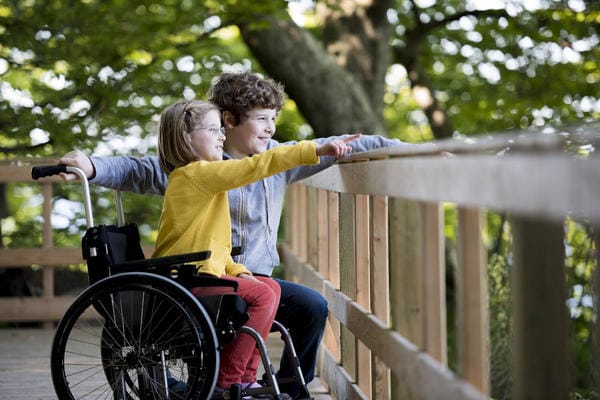 Having a sibling with special needs is a reality many children are born into, including my three typically developing children. Of all the things my children experience that I never did, their experience of growing up with a sister with significant disabilities is something I struggle to understand, even as I watch it unfold daily. The advantages to having a brother or sister with special needs are numerous and include being more empathetic, more responsible and more resilient. However, these typically developing siblings also shoulder tremendous burdens that are not often or easily discussed. Documentary filmmaker Rachel Feichter has a typically developing 11-year-old and a 7-year-old, Talia, who has special needs as a result of a neurological autoimmune disease, Hashimoto’s encephalitis. Feichter discovered that there is a lack of information regarding the full experience of having a sibling with special needs when she searched for information to help her older daughter. She wanted to better understand the needs of her typically developing daughter, as well as help her daughter connect with other siblings with the same struggles, so Feichter began interviewing siblings of individuals with special needs for her in-progress documentary, which has the working title “Not Typical.” While every sibling — and every family — is different, Feichter found some common experiences, many of which my children are having. Feeling like they need to be perfect. Siblings of individuals with special needs know how hard their parents work to ensure all of their sibling’s needs are met, and often see their parents struggle to meet these needs. Many feel like they can’t make mistakes because that would add to their parents’ burden, so they believe they must be perfect at all times. This is an impossible standard to meet, and can lead to stress and feelings of inadequacy. One girl said she felt like she “had to be Ms. Perfect and not have any problems for [her] parents to deal with.” Another said that she felt as though she could never be “enough.” Feeling like they can’t express their feelings. Most typically developing children love their sibling with special needs. Yet they may also resent how much of their parents’ time is taken up by caring for their sibling or feel embarrassed about their sibling’s behavior. One girl said she “was never allowed to mourn openly or to be mad or sad about [her] brother” and another said her friends thought she was being mean if she said anything bad about her sister, even though friends with typically developing siblings often complain. Having a different idea of family and home. For most children the concept of family is based in togetherness. But when a sibling has special needs, family quality time may look different. One girl recalled that her mother was “assigned” to her sister with special needs and her father was “assigned” to her. The family often spent time apart, especially when it involved leaving the house. In many families, the sibling with special needs may not be able to attend certain events or go certain places for a variety of reasons, including therapy and medical appointments, physical barriers to access, or sensory issues. In some cases, the presence of caregivers and therapists may redefine what a family home is for children. In my home, for example, our child with special needs is normally fed by a personal care attendant. A therapist is often present at our family meals as well. Nonfamily members are typically also present even during lazy weekends at home. Some siblings said that places outside the home, such as school or a relative’s house, are more of a refuge for them than their home. Feeling as though their problems are minimized. Sometimes a sibling with special needs has complex and even life-threatening problems. An issue faced by a typically developing sibling, whether it is a problem with a friend or an academic struggle, may seem small compared to having limited mobility, learning difficulties or sensory issues that require intensive care or prevent a child from attending the neighborhood school. One girl said her parents rarely dealt with her problems, instead telling her to be “strong.” Another felt her parents never took her problems seriously because they considered her the “lucky one” for not having a disability. Feeling isolated. Typically developing siblings may be lonely because they don’t have peers who have siblings with special needs. So they feel different when their friends ask “what’s wrong with your sister?” Some children also feel self-conscious about their sibling with special needs, and aren’t sure when or how to tell their friends about him. Others feel uncomfortable inviting friends over because they are unsure of how their friend or sibling will react. Dealing with intolerance early and often. Children learn early that there is not universal acceptance for individuals with special needs, and that their sibling is not welcome everywhere that typically developing children are. This can be deeply disappointing to typically developing children who want to have shared experiences with their sibling. They regularly encounter individuals who refuse to move from seats designated for individuals with disabilities, and those who make unkind comments about other accommodations their sister needs. These early lessons in intolerance, and even hate, can affect their world view and make them cynical or resentful of the limitations placed on their sibling and themselves as a result. Feeling like they are asked to help too much. Some typically developing children are expected to help care for their sibling with special needs from a young age, even if that sibling is older. One girl said that she felt like the “attention police” at home since her mother was constantly telling her that she had to pay attention to her sibling with special needs. Others are expected to push wheelchairs, participate in therapy sessions, or attend to their sibling’s personal care needs by feeding them or helping to get them dressed. Many are told early on that they will be expected to care for their sibling when their parents are no longer able to do so. This puts enormous pressure on them. Feeling like they must grow up quickly. Because of the sum of their experiences, from feeling as though they are on their own to handle their problems to feeling pressure to be perfect to being given responsibility for their brother or sister, some siblings of children with special needs feel as though they are forced to grow up too quickly. Most typically developing children love their siblings with special needs beyond measure and are close to them. But to better understand and support them, it’s important to acknowledge their struggles. There is a need for more information about the experience of growing up with a sibling with special needs. While there are a few places the stories of these siblings are told, such as the fictional book “Wonder” by R.J. Palacio, hearing from the siblings themselves in “Not Typical” will help many feel less alone and better understood. Jamie Davis Smith is a Washington-based mother of four. She can be reached at [email protected]. Follow her on Facebook and Twitter @jamiedavissmith. 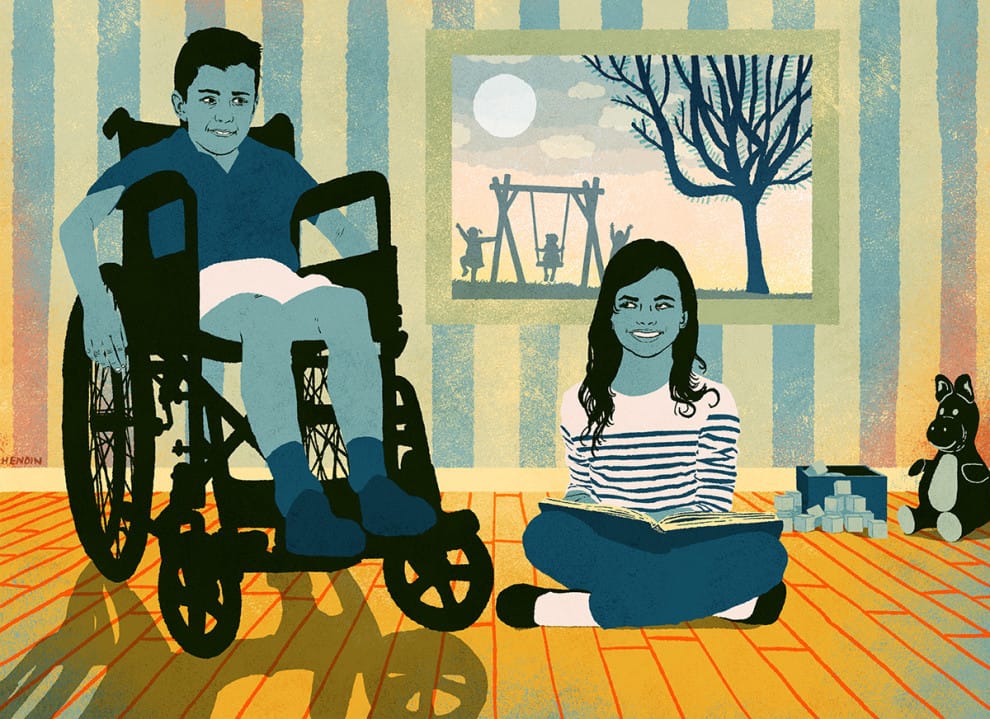 I don’t remember having to be told that my brother was disabled, but I have to break it to other people all the time. When people ask if I have any brothers or sisters, I tell them I have a brother. They ask how old he is, and I say he’s my twin. This immediately gets them excited. They want to know if we went to the same school, if we look the same, if we can communicate telepathically. I feel like I’ve made the conversation awkward when I tell people that he’s severely disabled. (I wish there was a better word for “really disabled” than “severely”.) Teachers go quiet and walk away, casual friends apologise as if it’s their fault, and people look embarrassed to have asked in the first place, as if I’ve confessed a deeply personal family tragedy. The best kind of person asks lots of questions. They’re insatiably curious. Their desire to know more outweighs any embarrassment. I know if the situation was reversed I would be too shy to be this kind of person, but they’re brilliant because they keep the conversation going. I’m normally a little bit intimidated by extremely confident people, but not when they’re brave enough to ask me about my brother. His name is Jack, and we were born 11 weeks early. Jack weighed 3 pounds 2 ounces and I weighed 2 pounds 10 ounces. A few days after we were born, Jack had a brain haemorrhage. He was left with cerebral palsy, hydrocephalus (water on the brain), and epilepsy. He can’t walk, talk, or interpret images that he sees. While I’m aware that finding all this out must have been awful for my parents, I don’t remember any of it. I’ve never known anything different. We’ve always had a disabled parking space outside our house, always jumped to the front of airport queues, and always had silly family traditions to keep Jack entertained. When he was little, Jack would scream when the car stopped at a red light, so we would chant “Red light Jack! Red light Jack!” until he laughed. Right before he’s about to cry, he sticks his bottom lip out for at least a minute, giving us time to sing the “Put that lip away, Jack” song. During mealtimes we have quizzes or play alphabetical word games so he doesn’t get bored. Relatives and friends who come to visit are swept up into it. One minute someone is a total stranger to the house, the next they’re trying to come up with a fictional character beginning with Q. I think it’s safe to say that our interactions with guests would be a lot more boring if we didn’t have Jack. We’ve always had a disabled parking space outside our house, always jumped to the front of airport queues, and always had silly family traditions to keep Jack entertained. As a child I read a couple of books from the point of view of children with disabled siblings. Neither of them reflected my experience. In one, the disabled little brother died at the age of 2. Obviously this happens, and it could have easily happened to me. The only part that didn’t ring true was the main character’s school friends, who immediately made fun of her brother when they found out he had been born with impairments. I don’t know if times have changed since 1988, when the book was published, but since 1992 my childhood friends have been, at best, kind to Jack and, at worst, indifferent. In another book, the main character was embarrassed to invite friends over to her house because she didn’t want them to meet her disabled sister. This didn’t seem right either. The disabled sister was older, so the main character could never have known anything different. Nearly all of my friends met Jack so long ago that I don’t remember it, and by the time I introduced my university friends to him I knew everyone was an adult and would be mature about it. None of this is to say that I had no negative childhood experiences because of Jack. I was often jealous when I saw friends playing with their brothers or sisters. When I was 10, I kicked a friend at a sleepover after watching her kick her little sister in the face, because I couldn’t understand how anybody lucky enough to have a nondisabled sibling would want to hurt them like that. I know better now. I’ve never had the same reasons to fight with Jack; we’ve never had to vie for our parents’ attention, never had to argue over whose turn it was to use the internet when we only had dial-up, never fought over possessions or who got the best GCSE results. Jack is not comparable to me as we cannot be measured on the same scale. I’m confident that our parents love us equally (or at least, that’s what my mum said when I asked her). My achievements are not his shortcomings. I’ve been lucky. When Jack has become dangerously ill, so ill that he could have died, I was either so young that I had no idea what was going on, or so young that I was deliberately kept in the dark. The shunt in his head that drains out the brain fluid has blocked twice: once when we were 3 (I have a vague memory of knowing Jack was “poorly”) and once when we were 13. At 13 I knew the medical situation, I knew that he was in and out of hospital. But nobody told me he could have died. Looking back at my diary from the time, it’s pretty horrifying how quickly I jump from a casual mention of Jack’s hospitalisation to a lengthy paragraph about someone saying something mean to me at school. I didn’t find out how much danger he was in until afterwards, when he was out of the woods. They didn’t want to worry me. The greatest emotional distress Jack has ever caused me is worrying that I’m not worried enough, which is a luxury problem. Jack is fine. He lives in a house with four other young disabled people, and 24-hour care. The people who look after him are almost supernaturally lovely. For our birthday they arranged for four actual owls to visit his residential home and fly around landing on his knees. I would not be able to do what those professional carers do. Jack needs constant attention: He needs people to read to him, talk to him, feed him, change his clothes, wash him. As his sister, I’ve never done anything beyond what I would consider to be the normal sibling call of duty. I’ve not done anything shower- or toilet-related, apart from when we were so young we would share a bath. I’ve never fed him more than a mouthful. The most I do is read to him and sing to him, which I see as the equivalent of the conversations we would have if he wasn’t disabled. And really, I benefit from this too. He’s the only person who appreciates my out-of-tune rendition of every song from The Sound of Music. Jack is different from anyone else I’ve ever met; he remains the most purely good person I know. The only thing I feel that I miss out on is the twin-ness. I’ve never spent much time around other twins, particularly not boy-girl twins, and I suppose if I did it would make me sad. There’s a whole parallel universe that I try not to think about where everyone knows Jack and me as “the twins”, where we went to the same school, where he’s friends with my friends, where we argue about things. I can’t fully imagine what Jack would be like if he wasn’t disabled. I don’t know what his political affiliations would be, or his annoying quirks, or what else might have surprised me had he grown up like everyone else. As Jack is different from anyone else I’ve ever met, he remains the most purely good person I know. I sort of believe that everyone (including myself, and everyone I love) is a bit of an arsehole. Jack can be irritating. He shouts, he’s grumpy, he won’t be satisfied with any song on his iPod or any book you read to him, but he doesn’t have the intellectual and emotional capacity to be mean. It’s not a good thing that Jack’s disabled, but it feels like the sad bit happened a long time ago. I was born two minutes after him, so I didn’t have the opportunity to build up alternative expectations. I missed out on all the regular twin stuff, although sharing a birthday is still pretty great, but I know that if it wasn’t for Jack I would be too shy to be comfortable in the presence of other disabled people. I flinch at the word “spastic” in a way I might not do otherwise. Although I don’t always see Jack’s disability, this doesn’t mean that I don’t see any disability. I’ve got more used to other disabled people now, but when I was younger and would go to Jack’s school with my mum to pick him up I would see a crowd of people with unfathomable impairments, and Jack would look like the odd one out. So when I tell people I have a disabled twin brother and they’re uncomfortable, I feel like I’ve misled them. What I really have is Jack, my twin, who happens to be disabled. He’s not a sob story, he’s just Jack. Written by: Anne Suslak BuzzFeed Contributor Asperger’s Rhymes with Bass Burgers: Asperger’s from a Sibling’s Point of View by Oliver Spellman11/14/2016 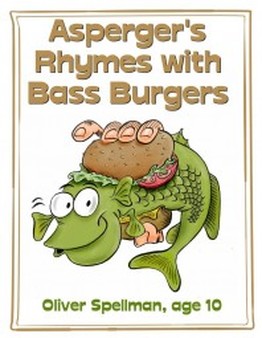 Rhonda Spellman is an autism advocate, author, speaker award winning author of The Journey Home from Autism and she is columnist at Beyond the Spectrum. We thank Ms. Spellman for writing a wonderful guest post about how her son, Oliver, aged 10, wrote his very first book. I read that Ms. Spellman first became a published author at 17. She has been writing “ever since.” You could call it subconscious, super-natural or super-spiritual. You might choose to call it something altogether different but you just had to be there. Maybe then you could understand. I was there and I’m not sure I fully understood but I decided to go with it because, deep down, I believed. As the mother of two boys, one with Asperger’s Syndrome, I needed something to believe it at that moment. It all started the night before with these words from my 10-year-old son Oliver, You don’t love me as much as you love Tanner. Everything is for Tanner and everything is about Tanner. It’s always Tanner this and Tanner that…The door slammed loudly and – thankfully – his voice – and words – were somewhat muffled. This was my chance to come up with something profound and supportive; something that would prove to him that his father and I loved both of our boys equally. Somehow every great thought that seemed to flow in flowed out just as quickly and I couldn’t stop the tears from welling up in my eyes. I poured myself a cup of coffee and began to pace the floor. My mind seemed to have a mind all of its own. Images of holding Tanner while he screamed and waiting room walls danced across my eyelids until my vision became blurry. I blinked away the tears to zero in on my counter top covered with enough oils, herbs and supplements to open a paraphernalia shop. My poor Oliver was immersed in a life that he didn’t understand. We were all immersed with helping Tanner and I had somehow failed to notice the depth. A short while later my husband returned from work. He was given his new assignment: play with Tanner until Oliver and I returned. Before he knew what hit him, we were on our way out the door to get an ice cream – just Oliver and me. We got ice creams and headed to one of our favorite parks nearby. I was troubled, to say the least, with not knowing what the answer was – if there was an answer. And, if the elusive answer turned out to be a logical one, how would I implement this new and improved plan after it was revealed to me? If Oliver was suffering he didn’t show it. Thankfully, there were several other children to play with at the park and most of them were in various stages of eating ice cream as well. A perfect setting to reflect I thought… Well, I never got the chance to reflect – or deflect – as the case turned out. Suddenly, I was bombarded with a little army of children who wanted to be pushed, pulled, tickled, chased, hiding, hidden from… and our afternoon of play turned out to be just what Oliver needed. It was all good but – back to the original thoughts of what I chose to believe. Just so you know, I think you would have, too. The next morning I was lying in bed and rehearsing moments of how I did that and how I should have done this and I was concentrating on how I could possibly help Oliver to feel really special. Suddenly, I got this image of a book cover with a big fish sandwiched between two sesame seed buns and the words Asperger’s Rhymes with Bass Burgers above this silly fish. I just about laughed out loud. Like I said earlier, you had to be there. Well, I was so excited about this news that I could hardly stand it! I just knew that Oliver would be excited, too, so I practically bounded into his room. Hey, guess what, I began, and I told him the entire, exciting story; fully expecting him to be just as thrilled as I was. What? Write a story about my brother? Are you kidding me? Why would I want to do that? He’s sooo annoying. Well, I asked, isn’t there anything about Tanner that isn’t annoying? After all, this could be your way of helping everyone to understand how you feel. You might even help other kids like you who have a brother or sister with Asperger’s Syndrome. Yeah, right… he replied with less enthusiasm than he would have given to a suggestion that he clean his room. He sat on his bed and fired questions at me for awhile. How can Tanner be so smart and act so weird sometimes? I reminded him that there were many wonderful times, too and asked him if he couldn’t think of at least one. He began, Do you remember that time when we were at the Museum of Nature and Science and Tanner asked that astronaut about the Black Hole? That was pretty cool. I think he knew more than that astronaut did. You know mom, I don’t think that guy was a real astronaut. I felt like I was dreaming. Hold on Oliver, I said, let me get a pen and paper! Indeed, it was like a dream. We sat there and, in just a few hours, he had verbalized his feelings about the annoyingness and the awesomeness that come with being the sibling of someone who has Asperger’s Syndrome. I had several pages of thoughts and ideas. And, just like I do with the children in the writing program I teach, I coached him to turn his thoughts into sentences and paint a picture with his words. Two of my favorite pages follow: Asperger’s Syndrome can be an awesome thing and also an annoying thing. It’s kind of hard to describe so I’m telling you this story to help you understand. The first thing for you to know is how to say Asperger’s. Just remember this: Asperger’s rhymes with bass burgers. The next thing I’d have to say is that most people who have Asperger’s Syndrome are really smart like Albert Einstein, my brother and many other people. For example, Tanner knows just about everything about animals and he likes to watch movies with David Attenborough. Before I knew it, we had an ideal picture of what Oliver felt and saw. I suggested that he might want to read it to Tanner. Tanner loved it and helped Oliver to make a few minor changes. The rest, as it’s commonly said, is ‘history’. I talked with a list of illustrators and every single one was wonderful in his or her own way. In the end, Oliver chose the illustrator he liked the best and we have been working with Des ever since. He has become almost like family. Currently, he is illustrating Tanner’s first book that he wrote when he was five and the first two books from my children’s writing program. It’s always interesting to me to see how we try to make things happen in some precise time and fashion that seems perfectly logical at the moment. It took well over year to pull everything together in order to release Oliver’s book. Every month felt like another year and I spend hour after hour learning how to do all of the jobs that needed to be done. Finally – Asperger’s Rhymes with Bass Burgers was released the very same week as the first major rewrite – in nearly 20 years – was revealed with Asperger’s Syndrome being removed from the diagnostic guidelines. Was it a coincidence? Maybe it was just timing? Perhaps it could be called dumb luck. It’s hard to know. I can only say that the diagnostic guideline might have changed but the very special people who need to be understood didn’t. I believe that this book truly speaks to us all. Rhonda Spellman
Buy Kindle edition/ Ebook Amazon.com Amazon.ca 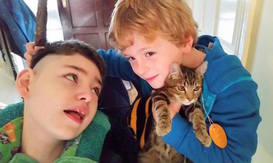 To my dearest son, Declan, How is it that tears fill my eyes before I even begin to write to you? I can only guess it’s because you hold the key to my heart like no other person ever will. You — my precious, precocious and beautiful son — are my heart. Now I can imagine parents out there who don’t have a child with a life-limiting illness may read this letter and say, “Oh, this is the way we feel about our child/children, too.” But Declan, I can assure you it’s different. As you know, my wise 7-year-old son (with an old soul), this journey we are on changes everything about life. Everything. From the time you were an infant and I would lie you next to your big brother, Brendan, you’d smile up at him in a sort of tender recognition. As the months turned into years, your bond with him — your unconditional love for him — has made me stop in my tracks in awe. Even now, I’m smiling as I type this, remembering you said something to me last month that I will always hold dear. You were matter of fact, but you were also clearly keeping my feelings in mind. You said, “Mom, I hope it’s OK, but I love my brother more than anyone in the world — even more than I love you.” How you melted my heart at that moment! Yes, my love, it’s absolutely OK to love him more than you love me. Please, please do. Because as you know, as we have gently discussed on far too many occasions, your brother won’t be with us in this life for very long. A couple of months ago when Brendan was in the hospital for 19 days, I bought you a mood ring at a local shop. Must be the old hippie in me coming out, right? I will never forget later that afternoon when we were hanging out in Brendan’s hospital room, you walked up to him, took off your new mood ring and placed it on his finger. You said, “Here, Brenny, this will make you feel better because it’s on the happy color now.” Have I told you just how much you amaze me, Declan? You have the most compassionate heart of any child I know. Last week, you stood by your brother’s side as his body seized out of control. His body convulsing, his lungs barely breathing, his skin losing the warmer colors and turning to blue. You said, “Come on Brendan, we’re right here, it’s OK.” And you held his hand. And you laid your hand on his head. And you said how much you love him. I saw every single second of it while I stood right next to you as I monitored your big brother. You have seen paramedics rush into the house at midnight to tend to your brother. You have seen your brother taken by an ambulance as its lights and sirens went off while we followed behind. You have seen tubes and masks and IV lines in your brother’s hands and feet often all at the same time. You have been to so many X-ray appointments for Brendan that you now just walk behind the screen and hang out with the X-ray tech, knowing that’s just where to go. (And that there is usually a great supply of stickers to be found there!) You have sat with me, quietly, when I simply couldn’t hide my tears no matter how damn hard I tried. You have taken on a sort of caretaker role unknowingly, but so acceptingly, and you’re innately mastering it. I know, my sweet and tender child, that much of this is not fair for you. So many times in your life you have already had to sacrifice by not being able to go where you would like or when you would like because Brendan simply wasn’t able for it. So many times you have cried because of those sacrifices. But hear this promise, Declan, and let it soak in: Everything you miss out on, everything you do for your brother and for me and every loving word you say to your brother, it all stays with me. It is emblazoned upon my mind, my heart and my soul, and I promise you it will all be made good. For you are growing into the kind of man who will make the world a truly better place. You will impart reason, compassion, sensitivity and great love in whatever you choose to do. My promise to you is that I will never, ever let the struggles of this journey turn you away from the beauty that you’re learning on this journey. You will be all that you can be. And that, my son, is everything. Originally post on the Mighty 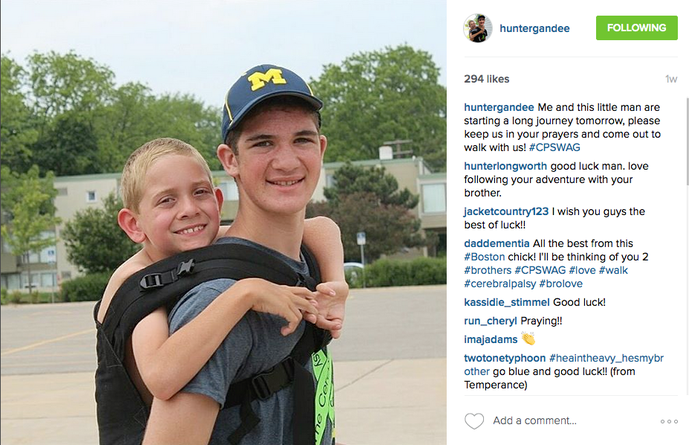 Every year, Hunter Gandee carries his little brother Braden on his back to raise awareness for those with cerebral palsy.Their journey, affectionately known as “The Cerebral Palsy Swagger,” is a miles-long trek across Michigan that serves to uplift people around the country. In 2014, the two walked 40 miles together. Last year, they did 57 miles. Monday afternoon, the boys’ third and final walk will come to an end at the Michigan State Capitol, the family wrote on Facebook. Braden, now 9 years old, is expected to walk the last half-mile in Lansing using his walker. “He's pretty excited right now,” 16-year-old Hunter said as the two set off in Temperance last week. The annual event is slated to come to an end as Hunter gets ready to go into his senior year of high school in the fall. “Braden is getting bigger,” Hunter told The Associated Press on Wednesday. “We've had a great time, so far.” Original Article HERE When someone communicates using a computerized voice, it can feel like, well, not their own. This family got the chance to create a more authentic voice for their daughter with cerebral palsy, and it’s pretty incredible. Erin wrote a letter to Dr. Patel who works with Vocal ID and explained that the voice on Maeve’s talker “sounds nothing like the voice of an 8-year-old, but there are no voices programmed that sound like one.” Then, the entire family went to visit Dr. Patel at Vocal ID’s headquarters where she helped Erin record different words and phrases and also helped Maeve record some sounds. They then created a new voice and vocabulary for Maeve’s talker, according to Buzzfeed. It took 10 months for the voice to be finalized, but when the time came to hear it in action, Maeve was undeniably the most excited. “I feel excited,” she said. “I want to say hi to Taylor Swift with my new voice.” Check out the Buzzfeed Article HERE 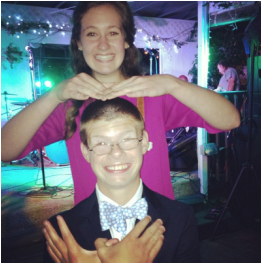 He’s outgoing and enthusiastic. He likes Netflix, as most Americans do. He indulges frequently in peanut butter -- reduced fat, if we’re getting into the particulars (but only because it has more sugar). He cheers for his school’s football team so passionately, he might as well be the mascot (although his position as assistant team manager will suffice). He’s well known around town -- for example, workers at our local McAlister’s Deli know his order by heart, and if it's a Tuesday night and the chocolate milk is running low, they'll hide one for him in the back. He also happens to be missing some genes on his seventh chromosome -- a genetic disorder known more commonly as Williams Syndrome, which affects roughly one in 10,000 people worldwide. It’s this last characteristic of my brother that rocked my and my family’s world when the diagnosis was made. Having a sibling with special needs comes with its fair share of ups and downs, but surprisingly, more of the former. One of the many ups is that my brother’s taught me a lot. Here are six lessons I’ve learned from having a sibling with special needs. 1. You can’t plan your life and expect it to play out in that way.Jack wasn’t diagnosed with Williams Syndrome until he was three years old. That means that for three years my family was imagining him growing up just like every other kid -- learning to drive, sneaking out to parties, heading off to college, you know the drill. That was a whole three years before the doctors dropped the G-bomb -- genetic disorder. Nonetheless, my parents took the news with stride, and life’s worked out in so many amazing and confusing and wonderful ways we had never before imagined. 2. Just because it's said, doesn't mean it's so.Just like you can’t expect your life to go as you plan, you also can’t take certain news as fate. Just because an authority gives his or her word on a matter, doesn’t mean it’s correct. When Jack was younger, physical and occupational therapists predicted trouble ahead. And even at the time, his lack of ability to reasonably perceive depth made him terrified just to step off of a street curb. Despite these predictions, Jack’s developed a taste for action and adventure, including basketball, bike riding, and even cliff rappelling, as the opportunity has presented itself. 3. You share a lot more than just a last name.When your sibling struggles in ways that many don’t, you become much more emotionally attached to his or her journey. You sympathize with his or her struggles, and you celebrate exuberantly with his or her successes. You share perspectives, as he or she shows you life with new eyes and appreciation for new things. You also share a bond that is stronger than any you’ve shared with anyone else. When we were younger, Jack and I would put our hands together in the shape of a heart, and then pinch our fingers down to make an infinity sign, saying “I love you times infinity.” Even though he no longer does this, being seventeen and "too cool for school," I know from his genuine and energetic greeting every time we get on FaceTime that we’re just as tight as we’ve always been. 4. You have to be the bigger person, even when you don’t want to be.Growing up, whenever kids gave my brother a hard time, every bone in my body wanted to rip them a new one. I despised them, not understanding how people could be so heartless. As I grew up, I realized that people act in certain ways for various reasons, and although a certain comment or action might be unjustified, fighting fire with fire isn’t the way to make the world a better place. People may disappoint you in life, but when you stand tall and swallow your pride, you’re bound to come out on top. 5. Disabled does not mean incapable.There are many things my brother struggles with due to his disorder, but hey, doesn’t everybody struggle with at least a thing or two? While there are certain things Jack struggles with, there are so many more that he excels at. He’s a pro at networking, thanks to his outgoing and cheerful demeanor. And when he was younger, there was no Transformers product he couldn’t transform, despite the unsuccessful attempts of everyone else in the family. And now, he is on track to becoming an Eagle Scout. Jack has obstacles, but to those, he says, “Challenge accepted.” 6. There is a God, and God is great.Some people might think that a diagnosis of a genetic disorder would erase one’s faith on the spot. After all, how could a God call himself great and loving after giving so sparingly and unjustly to one of his creations? But it’s not like that at all. When you have a sibling with special needs, you focus in a little better on what actually matters. Rather than feeling like you’ve been thrown a curse, you realize you have been granted a huge blessing, one that presents itself in the form of countless little blessings. For me, they’re the mercilessly tight hugs I receive each time I come home from school. They’re the way my brother sits down beside me when I’m upset and gently tells me to “turn that frown upside down”. They’re the unnecessarily but wonderfully excessive introductions to strangers: “Hi, I’m Jack Davis, a member of [Boy Scout] Troop 72 at your service.” God may have thrown us a curveball when he gave us Jack, but I can speak for my parents and myself when I say we wouldn’t have had it any other way. Whoever said that life is like a box of chocolates - he knew what he was talking about .- Elizabeth Davis in Ideas on Dec 14, 2015  A new joint report from Family Fund and the University of Portsmouth, ‘Do Siblings Matter Too?’, reveals the impact a disabled brother or sister has on a child or young person, showing their experience first-hand through photographs. This report highlights a number of key themes for siblings, ranging from elements of a typical sibling relationship to issues of lack of time, experience of aggression, violence and emotional upset. Data taken from over 2,000 Family Fund assessments contributed to the report, in which the key findings show:
“I think that being a sibling you get your ups and downs anyway…but just because there is the added bit of the disability sometimes you don’t know what she is going to do or how she’s going to take it or react, you have to be a bit more careful, because it can be a bit of a roller coaster, up and down.” Cheryl Ward, Chief Executive at the Family Fund, said: "Family Fund has supported siblings of disabled children through our Siblings Matter Too grant program for over four years with 1,487 grants provided. But with over 500,000 siblings of disabled children in the UK, we have a long way to go to reach all of those in need.” “This report shows just how important it is to recognize the vital role siblings play in the family, and in a lot of cases sharing the care of their brother or sister. Siblings are not identified within support services, , we are calling on policymakers to start the conversation on the needs and challenges of siblings and look at the services that need to be developed. Let’s listen to the voices and experiences outlined in this report and make this happen.” Jenny Peddar, author of the report and Senior Lecturer at the School of Health Sciences and Social Work, University of Portsmouth, said: “This study confirmed some expectations of the impact of having a sibling with a disability and raised a number of additional issues. Siblings experience a wide range of issues and this study showed very limited support for these young people. The complexity of life for these families needs wider recognition by services and the voice of the siblings needs to be heard by those working with the families.'” Read the report. Do you or your organization work with siblings of disabled children? Would you like to raise this issue with policy makers in your area? If so, please contact Family Fund. Natalie Breen was just four when her brother Patrick, younger by two years, was diagnosed with autism. Even as a young girl, it was a blow for her. "I remember when he was born; it was so exciting. I was going to have a sibling!" she said. She soon realized, however, he wasn't going to be a traditional brother like her friends had. "Why our family? Why us? Why me?" she asked.
Now, as a 22-year-old, Natalie accepts and cherishes her brother. But it took a long road to get there. "There are certain stages you go through." First, there was denial. She kept wishing the doctors were wrong or hoping he would have the kind of autism that doesn't manifest itself so openly. As a child she used to draw fake, perfect families, hoping one day they would be real. Then the anger. Her brother's situation meant, she said, "you are not the most important person in your house. Your parents' effort, and the people coming to your house, the therapist and the occupational therapist-all those people aren't there for you, but for your brother." She would get frustrated that simple trips to the grocery involved stopping to tie shoes, crying, fits over which side of the car to sit on, complaints that the lights were too bright. She regularly thought about how unfair it all was. Slowly, over many years, a shift occurred. She started seeing her brother not as a source of frustration, but as a unique person with his own strengths. "I looked at it from a different angle," she said. "He's an incredibly talented musician, and he has perfect pitch, and he can play the piano, he can play the drums, he is an excellent guitar player. When he started excelling at guitar, I realized I wasn't dealing with a burden; he is an individual who is in some ways much more talented and much more capable than I am." Sibling challenges Siblings like Natalie are often deeply impacted by a brother or sister with special needs. In addition to having anger and resentment, Natalie placed pressure on herself to be the perfect child to her parents. She hated softball and basketball but played them for years so her dad would have a team to coach and cheer for on the weekends. "I tried to really excel at sports because my father didn't have a son who he could go outside and play catch with," she said. She wouldn't ask her parents for a ride to the mall or $5 for ice cream because she didn't want to be a burden on them in any way. Even now, she feels the pressure to be successful in her career (she works in sales for a tech startup) so she can one day support her parents and brother. She even graduated from college a semester early to get the money rolling in sooner. Rachel Kleinhandler, a 17-year-old high school junior, felt embarrassed inviting friends over to her house after school in case there was an episode by her younger sister Sophie, who had a severe form of OCD. There were times, she remembers, "when I would get anxious when Sophie was anxious" If her sister was having a tantrum, she would run into Sophie's room and take away the scissors so she couldn't harm herself or others. Rachel also felt an obligation to take care of her sister. "As her older sister I took it on as my responsibility. There are times when she calls me her mom because I act like it, and I want to help her. I want to do whatever I can to support her." One of the scariest moments was when her sister attended a treatment center across the country. "I felt like I was in zero control of what was happening," she said. We asked older siblings of children with special needs to give advice on how to address some of these challenges. Here is what they told us: Advice for parents Build a wide support system Laura, a 26-year-old advertising executive, has a younger brother who is 23 and has a form of autism that makes it hard for him to communicate. As one of four kids, she felt the best thing her parents did was create a wide support system for her autistic brother so the burden didn't fall as much on the family. "He had after school programs, he had teachers who came to our house during dinner time, he had a lot of support so that didn't put as much pressure on us or my parents," she said. "They were able to care for more kids," she said. Aunts and uncles would also step in and help spread out the responsibility. Be open with your children and include them in decision-making. Parents often try to shield siblings from what is happening. Natalie says that approach is well-intentioned, but it can cause more harm than good. "You want to feel like a team," she said. "You want to feel like you are in this together, because too often the parents feel like a team and you are siloed, so it's just you by yourself. If you include your kids in the conversations and let them help you make decisions, it's huge because you feel like it's not just on you." Set aside special time for each of your children Rachel feels that the most important thing for parents is to "just remind your kids that you are always there for them and maybe set aside time for siblings so they know they are still cared about and loved." This can be a private vacation, a special activity once a week, or five minutes before bed. Your children will cherish this time, she added. "I took the time that I did get with my parents not as much for granted as I had previously." Advice for siblings Reach out to others When she was younger, Natalie felt she was the only one in her situation, and that no one could possibly understand what she was going through. Once she got older and talked openly about it to friends, teachers, and boyfriends, she realized she was hardly alone. She even wrote an article about her challenges on a website and received thousands of responses. "The more you hold it in, the worse it is," she said. "When you put yourself out there, it's scary—you don't know what will happen. But you have to put yourself out there and find support and realize you aren't by yourself." Laura agreed: "I can see that it can be isolating as a sibling," she said. "I feel like the support network is very important for caring for someone with a disability. We especially need to reach out." Make special time for your sibling The more siblings spend quality time with their brother or sister with special needs, the more they realize how remarkable that person is. Laura realized how hard-working her brother was. "He is doing things all day and working all night, and he usually does it with a good attitude," she said. "He's taught me a lot." She sets aside time to do special things with him so she can appreciate him more. He loves Aladdin, so she recently took him to see the musical on Broadway. They also regularly go to a theme park near the family home on Long Island. Now that she can drive, Rachel likes to take her sister to Starbucks when she is getting frustrated with her schoolwork, to get a break. It's a special time they can share, and it helps them grow closer and appreciate one another. Make time for yourself Many siblings feel guilty about wanting a break from their sibling with special needs, but getting time away is essential, said Rachel. "That was a major thing for me, and I had to step back at some points and have a break from it all. In the summer, especially, I get to be anxiety-free instead of worrying all the time. Just going out to dinner with my friends or going to see a movie helps." Focus on how your experiences have helped you Looking back, Rachel realizes how having a sister with OCD made her the person she is today. She became more independent because she felt she couldn't ask her parents, who were always so busy with her sister, things like how to solve a homework question. "I figured it out on my own," she said. She also thinks it made her a more aware and sensitive person. When her sister went into a treatment center she channeled her need to help into serving others. She "wasn't able to do much," she said, so "I took it upon myself to help others." She joined J Teen leadership, a teen-led community service organization and soon started chairing it. Laura believes having an autistic brother made her more curious and tolerant of people different than her. She spent a year in China teaching English, something she might not have done otherwise. Natalie learned the life lesson of not measuring people against each other. "I think you are always comparing people to yourself," she said, "And when you stop comparing someone to yourself and start thinking they are being the best person they can be, that's when your eyes open and you are like, 'Oh this makes sense and this is right and all is good.' By Alyson Krueger For more information click HERE Click HERE to find more about My Big Brother Bobby 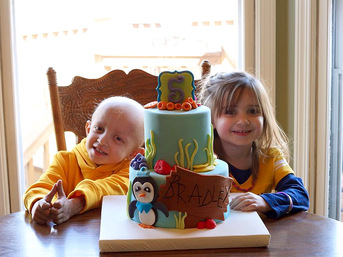 The question was poised carefully last January to Charlotte "Charlie" Godish, then 4: "Your brother is sick and to get better, he needs your blood cells," Brian and Jennifer Godish of Elgin, Illinois, told their shy and softspoken daughter. "We're wondering, how would you feel about helping him?" After pondering the question for a moment, Charlie suddenly smiled and said, "Okay, I'll do it. I want to help Bradley. Let me know when you need me.'" Now six months have passed since Bradley Godish's stem cell transplant in February to eradicate an aggressive form of leukemia. He and Charlie, his fraternal twin, have just started kindergarten, are back to their usual antics at home and are showing no ill effects from the surgery. "They've both bounced back nicely – our hope is that the further out we get from the transplant, the better the chances are that it will never come back and he'll have a full recovery," says the twins' transplant coordinator, Dr. Jennifer Schneiderman, of the Ann and Robert Lurie Children's Hospital of Chicago. If Charlie and Bradley were identical twins, the transplant wouldn't have been recommended, Schneiderman tells PEOPLE, "because identical twins have a higher risk of carrying the same type of leukemia. But as fraternal twins, Charlie had the same chance of matching Bradley as any sibling donor. In this case, she was the very best match we could find. She's a very brave little girl who didn't complain or cry once." The question was poised carefully last January to Charlotte "Charlie" Godish, then 4: "Your brother is sick and to get better, he needs your blood cells," Brian and Jennifer Godish of Elgin, Illinois, told their shy and softspoken daughter. "We're wondering, how would you feel about helping him?" After pondering the question for a moment, Charlie suddenly smiled and said, "Okay, I'll do it. I want to help Bradley. Let me know when you need me.'" Now six months have passed since Bradley Godish's stem cell transplant in February to eradicate an aggressive form of leukemia. He and Charlie, his fraternal twin, have just started kindergarten, are back to their usual antics at home and are showing no ill effects from the surgery. "They've both bounced back nicely – our hope is that the further out we get from the transplant, the better the chances are that it will never come back and he'll have a full recovery," says the twins' transplant coordinator, Dr. Jennifer Schneiderman, of the Ann and Robert Lurie Children's Hospital of Chicago. If Charlie and Bradley were identical twins, the transplant wouldn't have been recommended, Schneiderman tells PEOPLE, "because identical twins have a higher risk of carrying the same type of leukemia. But as fraternal twins, Charlie had the same chance of matching Bradley as any sibling donor. In this case, she was the very best match we could find. She's a very brave little girl who didn't complain or cry once." Charlie is a champion and an inspiration, her father, Brian 36, an account manager for a video and display company, tells PEOPLE. "As a parent, you want to be a hero to your child, but our kids have been heroes to us. And this whole ordeal has brought the two of them even closer." Although they are twins, Charlie and Bradley (the oldest by one minute), couldn't be more different, says Jennifer, 36, a part-time community college counselor, who also cares for another son, 14-month-old Camden. Bradley is blonde and left-handed while Charlie is dark-haired and right-handed, "and they each have very different personalities," she tells PEOPLE. "Charlotte has always been the bashful one, while Bradley has always been outspoken and protective of her. But when Bradley got sick, they each seemed to switch roles." "We wanted Charlie to feel like she was part of the decision-making process and wanted to prep her mentally," says Jennifer. "So we explained that Bradley's blood was sick and hers was healthy, and she said, 'Let's do it.' She's always been a giving kid." The transplant on February 17 was trouble-free, with Charlie experiencing only minor pain for a few days afterward. "She had a big bandage on her lower back and she didn't want to take it off because it was her badge of honor," says Brian. "She wanted to show everyone that she'd helped Bradley." Bradley now has to be evaluated every two weeks to make sure that he isn't relapsing, says Jennifer, "but we're optimistic that all will be fine. We want him and Charlie to remember this time in their lives and how they were there for each other. The bond and the love they have as twins is now even stronger." To read to fill article click HERE 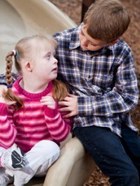 If you grew up with a major disability, you'll know first-hand the effort and energy it can require of families. There are medical appointments and medications to co-ordinate and in some cases, behavioral problems to manage, all very time and mind- consuming tasks. So while all of this is taking place, who is watching the siblings? For some the challenges are manageable, but depending on the nature and severity of the disability, the effects of being a very young “carer” can be felt for a lifetime. Listen Here: http://www.abc.net.au/radionational/programs/lifematters/giving-a-voice-to-siblings-of-children-with-special-needs/6618918 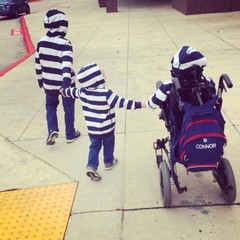 Hey there, I heard you’re the sibling to a child with special needs, and I wanted to write you a letter explaining why you have a one-up on life. I know your life might seem hard or different from your friends, but trust me, you most definitely will be more prepared for this life than anyone else. Let me explain… I heard you deal with more than any child should. Your parents spend a lot of time away from you. You know they’re taking care of your sibling, possibly bringing him or her to the doctor. Maybe your sibling is admitted in the hospital often; your parents might be on the phone taking care of insurance business or even physically caring for your sibling. I know, my friend. You see this more often than not. You see the love your parents have for your special sibling, and it’s being embedded into your heart. You see the patience they exhibit when caring for him or her, and it’s being buried into your soul. You see that your parents never stop trying to get what your sibling needs, and it’s being ingrained into your mind. You see your parents exhaust themselves so your sibling and you are well taken care of, and you’re learning from this. You may not know it, but all of these little things are teaching you traits of how to be an amazing person. I’m certain that being the sibling to a child with different needs is a struggle. I know you have those moments where your heart stings with jealousy, where you’re worried sick over your sibling. I know you have those moments when you get mad because you can’t go to all the birthday parties you want to. All of those times are totally understandable. You have a right to be upset every now and then, but I can bet that you can think of some pretty cool things you have in your household that your friends don’t. How about all the cool equipment your sibling has, huh? I know you’ve climbed into that wheelchair or played with his super cool assistive technology toys. How about getting to see your sibling reach a milestone and that proud feeling that overcomes your body? You get to experience a friendship like no other. Your sibling completely and utterly trusts and loves you with a love that can penetrate the coldest heart. They look at you with those beautiful eyes and know you’re there for them no matter what. The bond you have is indescribable. You’re their sibling, their friend and their protector. Your sibling might not speak verbally, but we both know your hearts together carry on conversations us adults could never possibly understand. And I tell you what, we’re so extremely jealous. Did you know your parents watch you and your sibling’s interactions on a daily basis and their heart literally wants to burst out of their body with pride and love? They see everything you do for your brother or sister. They notice when you walk by and give them a quick kiss, stroke their hair or give them a hello. Your mom and dad love to witness you sticking up for your special sibling or when you go out of your way to make sure he or she is included in everything. They quietly observe you as you help with therapies, put oxygen masks back in place and hold hands during tests or doctor visits. Your parents recognize every time you perch yourself on the counter to help prep medicines or bring them a diaper, a syringe or whatever else they need. You do such a crazy amazing job helping your parents. It surely takes a wonderful little boy or girl to do what you do on a daily basis. I’m sure they tell you thank you, but sometimes if they don’t just know they are beyond thankful for you.
But most important of all, my dear one, the reason you are going to rock this life: You know true love, you know true heartache and you know what’s truly important. You have lived a life that takes a strong heart and a strong mind. You will mature much faster than your schoolmates (don’t be too hard on them), you’ll exhibit compassion that astounds others, you’ll know more about healthcare than 95 percent of adults you pass on the street, and you will most definitely have a wicked sense of humor that will enable you to keep life joyful no matter what. When you were introduced to your sibling with complex needs for the first time, that moment in time is pinned in the stars, for it was then that your destiny was determined. You will be an awesome human being and you’re going to change lives for the better… all because you were the sibling of a child with special needs. Rock on, my brave friend. All my love, The momma of a child like you and your special sibling. This post first appeared on Mommies of Miracles. Want to end the stigma around disability? Like us on Facebook. Read more: http://themighty.com/2014/12/dear-sibling-to-a-child-with-special-needs-let-me-tell-you-why-youre-amazing/#ixzz3i9cc5WJz |
AuthorRebecca is an independent publisher working to help siblings of children with emotional challenges. Archives
April 2017
Categories
All
|
My Big Brother Bobby: A Story to Help Kids Understand Angry Feelings and Behaviors in Others
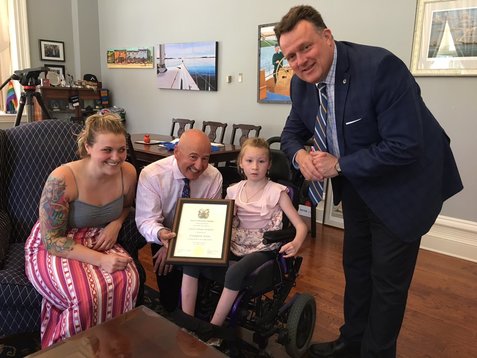
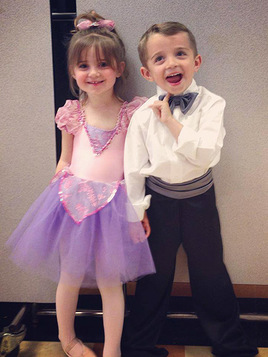
 RSS Feed
RSS Feed
